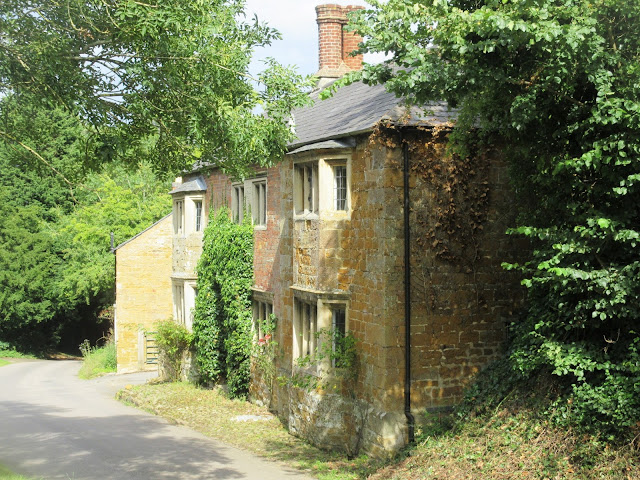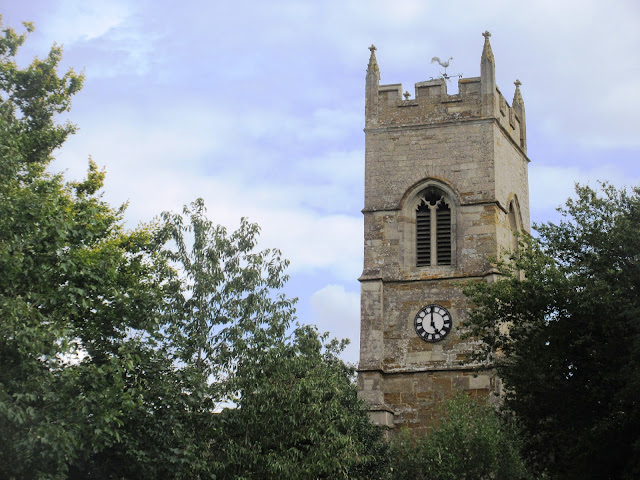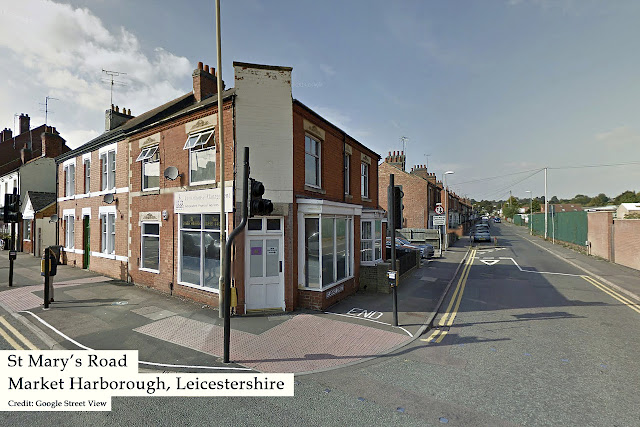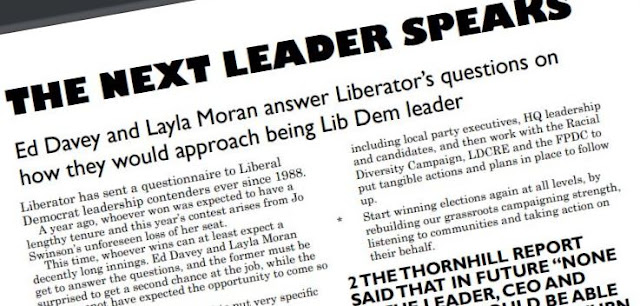At this point Alan Knott came in and began batting with his usual impish brilliance. This had the effect of waking Boycott, who had seemed genuinely distraught at Randall's demise, and the two of them put on over 200. England made 364 and went on to win the test.
Liberal Democrat Blog of the Year 2014
"Well written, funny and wistful" - Paul Linford; "He is indeed the Lib Dem blogfather" - Stephen Tall
"Jonathan Calder holds his end up well in the competitive world of the blogosphere" - New Statesman
"A prominent Liberal Democrat blogger" - BBC Radio 4 Today; "One of my favourite blogs" - Stumbling
and Mumbling; "Charming and younger than I expected" - Wartime Housewife
Friday, July 31, 2020
Alan Knott turns the Trent Bridge Ashes test in 1977
Germany: Fox steals over 100 shoes in Berlin
Lord Bonkers' Diary: The Wernher von Braun of the Flow Country
Thursday, July 30, 2020
Six of the Best 946
Northampton's greyhound stadium lies beneath its new university campus
Lord Bonkers' Diary: 'Layla Moran Saves Ducklings from Drowning'
Wednesday, July 29, 2020
Ealing Studios was worried about bombsites by 1950
I know, there's that bombed house in Bangkok Street.No, he wants to keep out of bombed houses. That's how my brother got pinched.
In Ealing's Hue and Cry (1947), a damaged London belongs to errand boys and the film celebrates their independence and resourcefulness.In Mandy (1952), the final scene of liberation, where the little deaf girl goes out to play with other children, takes place on a bombsite.Last night I watched Passport to Pimlico (1949) last night and it proved a little more equivocal.The local bobby visits a woman whose husband is always making models."It's an idea for that dump out there," she tells him, meaning a bombsite. "Give those kids somewhere decent to play."He looks out at the small boys scuffling in the dirt and replies: "They seem to be doing pretty well as it is."She replies: "I'd have something to say if I was their mother."
Lord Bonkers' Diary: Layla Moran’s radical stance
A philosophical question: Did I miss seeing Geoff Boycott run out Derek Randall?
I shall be voting for Layla Moran
Tuesday, July 28, 2020
A portrait of Northampton in 1963
This exhaustively detailed account of Northampton in the early 1960s may lack cinematic flair but the passage of time has left us with a snapshot of a town on the up and keen to expand. This film was made for an unnamed company that was keen to relocate to Northampton - or as they tell us, to the town which has shopping facilities that compare with any London suburb and houses to rent for only 30 shillings a week. If you're a local you might even spot your own home.
Lord Bonkers' Diary: The great Liberal philosopher L.T. Duckworth
Monday, July 27, 2020
The Southwell branch in colour (1956)
Six of the Best 945
Lord Bonkers' Diary: Joy Division - what a charming girl she was!
Children in care, prisoners of war and modernism in East Farndon
My name is Edward (Teddy) Davis and I arrived at the home at the age of about 4 years, which would be 1943, and I left about 7 years old. I went to school and Sunday school at East Farndon.
It was a boy’s only home with ages ranging from 4 to 15. The Master of the home was blind. His wife was the Matron. She was a kind lady. We were fed and looked after very well and as long as we behaved, we were not punished. ....Each evening just before bedtime we were allowed to listen to “Dick Barton Special agent” on the wireless (very exciting). It used to be in the time slot now occupied by“The Archers”.Every Saturday morning two of the oldest boys would march us in twos to visit the cinema in Market Harborough to see the children’s matinee, where we would sit and munch our issued 3 digestive biscuits and a handful of penny chews while watching the likes of Roy Rogers, Gene Autrey (Westerns), Tarzan and various cartoons.Along the journey to Market Harborough was an Italian Prisoner of War camp and we would cross the road to talk to them through the wire fence.
Sunday, July 26, 2020
Brian Protheroe: Pinball
a simply delightful, understated jazzy pop track; it's entrancing and fascinating, the one song that leaves you wondering why it's not in regular rotation on oldies radio.
Saturday, July 25, 2020
More praise for The Devil's Crown
It seems to have been a deliberate attempt to copy the I, Claudius formula for success: a basically accurate dramatisation of historical events, albeit with a sensationalist interpretation; a strong cast, even if some of the names were not yet well known; a literate script; and a close eye on the budget.
While not scaling the heights of I, Claudius, it works well on those terms. It is better drama than the Beeb's earlier historical dramas and better history than its later ones.
Its greatest strength is its concept, the true story of the early Plantagenet Kings of England, Henry II and his rebellious sons, the 'Devil's Brood.' It is a story so dramatic as to require little sensationalising. Indeed the facts are so astonishing that it is sometimes necessary to be sparing with them in case they seem too unlikely.
Yes, two years after I Claudius, the BBC produced another sprawling historical drama about a dynasty with absolutely no moral compass. Like I Claudius, it is studio bound and all the better for it.
Unlike I Claudius, it has dramatic antecedents in that it’s a pageant play and accordingly makes innovative use of medieval illustrative techniques. Perspective is several centuries away and everything looks appropriately and decoratively fake. This is a world without “depth” as we understand it. This drama thus fulfills my nostalgic need for television drama that aspires to the condition of theatre rather than film. It is devoted to very twelfth-century aesthetic that is as eerie as it is beautiful.The Devil’s Crown also anticipates EastEnders in that it depicts the most horrific and dysfunctional family Christmases imaginable.
I would rank The Devil’s Crown among the very best of television dramas that were made in the period. It’s compelling, intriguing and often moving. Brian Cox himself described the show as ‘very ahead of its time’.
However, there are flaws, and not just the lull in the episodes focusing on Richard which I mentioned. Memorably, all historical TV dramas during this period were shot on set, even the exterior scenes. The BBC just did not have the money to stage big battles or build convincing sets of castles and the like.
It could lead to some imaginative storytelling as the sets were quite malleable. On being told that Louis VII has married Constance of Castile, Henry, then in Normandy, sees it happening before his eyes on the same set.
There are downsides. For some outdoor scenes they simply paint the floor green and the walls blue. A modern audience especially might find this jarring.
The Devil’s Crown may have been commissioned following the success of I Claudius, indeed there are some striking parallels between the two stories.
A wise and mostly benevolent monarch Henry II/Augustus is undermined during his long reign by his scheming and cunning wife Eleanor of Aquitaine/Livia who strongly favours her son for the succession Richard/Tiberius who ultimately is more suited to soldiering than leadership and has a brief and unhappy reign. The parallels only go so far, however, as Eleanor of Aquitaine is just not as malevolent as the arch-villainess Livia.
There were several historical dramas made during the period that tried to follow the I Claudius model of political intrigue and murder in a Royal Court. The Borgias and The Cleopatras were both panned for being lurid as they lacked the benevolent central character that Derek Jacobi’s Claudius provided, the stammering, much-mocked boy who grows up to become historian and Emperor.
The Devil’s Crown also suffers a little in comparison to I Claudius, but ultimately it’s a drama that deserves to be judged on its own merits of which there are many. This is a fascinating rendering of a very complex and brutal period of history.
I’m delighted to have seen it after first hearing of it a few years ago. It now belongs to television history. I hope that it finally reaches the wider audience it deserves.
J.K.Rowling, Cormoran Strike and Market Harborough's Green Man
"The ornate and ages church of St Dionsius rose proudly in the heart of the town, and beside it, in the middle of the central thoroughfare stood a remarkable structure resembling a small timbered house on wooden stilts.
"Once parking to the rear of the building on stilts, Strike left the car to have a smoke. He observed a plaque that told him the building was an old Grammar School built in 1614.
"Biblical verses painted in gold ran around the structure. Man looketh on the outward appearance, but the Lord looketh on the heart."
The latest (and last) Liberator has landed
- which Lib Dem MP is supporting the candidate they were bad-mouthing a year ago
- about ructions in Lib Dem LGBT+
- what has happened to Your Liberal Britain
Friday, July 24, 2020
James Fox and Sandy Lieberson on Performance
Ed Davey's campaign found to have breached data rules
Returning Officer's Ruling 23rd July 2020A complaint has been made by an individual about Ed Davey’s 2020 campaign’s use of data gathered in his 2019 leadership campaign for direct marketing.The party has taken legal advice and received representations from the campaign.The party’s advice concludes that a technical breach has occurred in relation to specific consents. We have advised the campaign of the issues, and have required the campaign to cease using the affected data now and to gain new consents before using it again.
Thursday, July 23, 2020
The Devil's Crown (1978)
Six of the Best 944
Wednesday, July 22, 2020
A 1969 film on comedy by Marty Feldman
Annie Ross — the veteran jazz singer, actress and founding member of the historic vocal trio Lambert, Hendricks & Ross — died on Tuesday, four days before her 90th birthday.https://t.co/mXMccYeV97
— NPR (@NPR) July 22, 2020
Malcolm Saville identifies the flaw in government plans for a register of foreign spies
The U.K. could require foreign states to name their spies operating in the country on a government register, under a crackdown being considered by ministers.
"I say," Dickie broke in, "spies are awful liars aren't they?"
New rewilding network launched
At least 300,000 acres of land could be "rewilded" in the next three years with the help of a project being launched to tackle the nature and climate crisis, its backers said.Campaign group Rewilding Britain is launching a network later this year to support and connect people including landowners, farmers, community groups and local authorities who are rewilding land or considering doing so.Rewilding involves the large-scale restoration of natural habitats and systems to help wildlife thrive, and can include bringing back missing species such as beavers to naturally manage the landscape.
Tuesday, July 21, 2020
From the Judith Stone to Ten Locks Village
Monday, July 20, 2020
Joan Dowling: A Star in the Making (1947)
The politics of Stig of the Dump
Lib Dem leadership contenders answer Liberator's questions
Sunday, July 19, 2020
Market Harborough to East Farndon to see the Judith Stone
Phil Simmons at Grace Road
Chris Leslie joins the bailiffs
Sitting on the front bench, Tony Blair surveyed the massed ranks of his parliamentary intake and then lent over to Gordon Brown.
"It’s weird,” he said "but there’s a guy back there who’s the splitting image of the boy who does your photocopying."
"That is him,” Brown replied. “He’s your new MP for Shipley."
He said a tie-up with other pro-EU parties "wasn't ever on the agenda", adding: "I don't think it will ever be likely because we are starting something new. We are not joining the Liberal Democrats or the Green Party."Instead, Mr Leslie urged Lib Dem members to switch allegiance and join Change UK, saying the "emergency situation" of Brexit required "a completely fresh overhaul of the centre-ground".
for a brief period, Chris Leslie was always in the media invited into studios to explain how cuts were unavoidable, Keynes was impossible and misery was the right medicine for the precarious and the poor. Now he has an exciting & poetic opportunity to see some of ideas bear fruit
— Brynley Heaven (@BrynleyHeaven) July 19, 2020
The Tremeloes: Call Me Number One
Saturday, July 18, 2020
Derbyshire, Leicestershire and Nottinghamshire villages in 1936
With every spare inch of his travelling hardware van packed with useful items Ken Hollingsworth takes to the road from the Long Eaton Co-operative store following a circular route through South Derbyshire, Leicestershire and Nottinghamshire. Film maker J.H. Poyser takes the journey in the passenger seat capturing rural lanes teaming with more cows than traffic and an eager public ready to buy everything from chimney brushes to clothes airers.J.H. Poyser filmed a series of promotionial and educational films for the Long Eaton Co-operative Society. A helpful map traces the route taken by the hardware van from Long Eaton via Castle Donington, Diseworth, Long Whatton, Sutton Bonington, West Leake, Kingston on Soar, East Leake, Gotham, Barton in Fabis, Thrumpton, Ratcliffe on Soar, Kegworth, Lockington, Hemington and back over the River Trent to Long Eaton. This is an area that has drastically altered over the years as a result of new road building, including the A453 Nottingham to Kegworth road and the route of the M1 motorway.
The right looks for converts: the left looks for traitors
The right looks for converts: the left looks for traitors.
John Leo, columnist for US News and World Report (and proud possessor of a link from Matt Drudge, no less), was kind enough to send me an e-mail assuring me that the original source is Michael Kinsley. Apparently, Mr. Leo included the line in a Nov. 26, 1990 column rounding up the best aphorisms of the year. He also is kind enough to tell me that the correct quotation is:"Conservatives are always looking for converts, whereas liberals are always looking for heretics."Apparently Mr. Leo complained in his original column that he did not like the "whereas"; I'm with him.













































